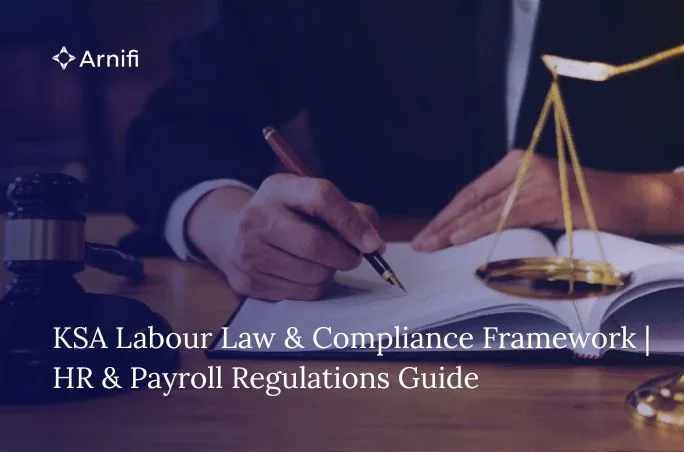Arnifi | KSA Labour Law & Compliance Framework
by Ishika Bhandari Oct 29, 2025  7 MIN READ
7 MIN READ

Table of contents
Learn to remain impeccably in compliance with Saudi Labour Law. From employment contracts, Saudization, to GOSI, the WPS, and visa procedures, this guide by Arnifi explains everything businesses need in managing HR, payroll, and labour compliance in Saudi Arabia.
Introduction
The Kingdom of Saudi Arabia (KSA) has rapidly modernized its employment and regulatory framework in line with Vision 2030, creating an exceedingly structured system for HR management, employment, and compliance. Compliance with Saudi Labour Law and its related compliance systems becomes extremely critical for companies operating in the Kingdom since compliance ensures that they carry out operations lawfully, transparently, and sustainably.
This document gives a complete detail of the KSA Labour Law, visa and onboarding process, salary structure (CTC), and local hiring regulations. It strongly emphasizes key government platforms like QIWA, Mudad, and GOSI, and how they relate to HR and payroll compliance.
Arnifi supports businesses in Saudi Arabia with end-to-end compliance management, including HR documentation, Saudization, payroll processing, accounting, taxation, and portal operations, so that Saudi entities can operate smoothly and in compliance.
1. Saudi Labour Laws & Compliance Setup
Employment Contracts
Every employment relationship in Saudi Arabia must be formalized through a written employment contract, in Arabic, that specifies the job title, salary, benefits, and working hours. Bilingual contracts (Arabic-English) are permitted; however, in the event of a dispute, the Arabic version prevails.
All contracts must be registered and monitored through QIWA, the Ministry of Human Resources and Social Development’s (MHRSD) centralized HR and compliance system. This ensures transparency by having contracts digitally registered, allowing for online verification, and providing employers with an efficient means of managing renewals and terminations.
Under QIWA, the minimum eligible salaries for registration of the contract are as follows:
- SAR 4,000 for Saudi nationals
- SAR 1,500 for expatriates
Employers should match the position, title, and salary in the contract with the Company’s Commercial Registration (CR) and the activity of the industry in the MHRSD system.
Wage Protection System (WPS)
Wage Protection System (WPS), which is run by the Mudad platform, aims for total payroll transparency in Saudi Arabia.
- Salaries must be paid through a bank registered in Saudi Arabia and reported through Mudad
- Employers are obligated under the Saudi Labour Law to ensure the timely payment of salaries
- WPS monitors differences between what is registered and what is paid, so that workers are paid in full and on time
Consequently, penalties may be imposed in case of violations, service may be revoked, and visa issuance or renewals may be restricted. Hence, compliance with this reporting on Mudad is mandatory for every active entity.
Saudization (Nitaqat Program)
The Nitaqat Program is one of the key initiatives under Vision 2030 aimed at enhancing Saudi nationals’ participation in the private sector.
- Each company must maintain a qualifying percentage of Saudi nationals among its employees, based on the company’s industry, size, and business activity
- Companies are classified into colour categories: Red, Yellow, Green, and Platinum, depending on the level of Saudization
- Companies that are in Green or Platinum can hire foreign employees, renew their work permits, and avail themselves of government services without restrictions
- However, if companies fall below compliance levels (Red or Yellow), they will face restrictions regarding hiring, visa renewals, and various other operations
It is, therefore, important for the continuity of operations and compliance with regulations to maintain a Green or Platinum Nitaqat level.
Social Insurance (GOSI)
The General Organization for Social Insurance (GOSI) is the obligatory social insurance system in Saudi Arabia that is in place for the protection of all employees, Saudi or non-Saudi.
Employers shall:
- Register every employee at GOSI from the date of employment
- Make monthly contributions by the 17th of each month to prevent fines
- Contribute 12% of the salaries of Saudi employees (for pension, social security, and work injury) and 2% on expatriates (occupational hazard insurance)
GOSI provides financial protection to all employees in cases of work injuries, retirement, and other social risks. Timely submission and accurate reporting provide the basic foundation of GOSI compliance.
2. Visa and Onboarding Process
The employment of foreign nationals in the Kingdom of Saudi Arabia must be in accordance with regulated processes for the issuance of visas and onboarding that are operated through MOFA, QIWA, and MHRSD platforms.
Work Visa Authorization
The process commences with a Business Invitation or Work Visa Authorization issued by the Ministry of Foreign Affairs (MOFA).
Following approval, the applicant may apply for a work visa either through the Saudi embassy or via authorized centers in their country, such as VFS Global.
Quota & Position Requirements
An employer must have an active visa quota in the QIWA system that matches the position and supports the company’s activity as registered with the Ministry of Labour (MOL).
90s upon arriving in Saudi Arabia, the following sections must be completed:
- Medical Tests and Iqama (residence permit) issuance
- Employment Contract Attestation in QIWA
- GOSI Registration
- Mudad Setup for salary compliance
- Employee Activation in HRSD Systems
Not completing the onboarding process within this time could lead to different compliance violations, including suspension of the employee’s legal status.
3. CTC Components & Alignment with KSA Market
Cost to Company (CTC) in Saudi Arabia represents Gross Salary, Allowances, and Employer Contributions. Knowing how the salary structure works will keep business entities compliant with GOSI and wage reporting systems.
A typical CTC breakdown includes:
- Basic Salary: 40%–60% of total CTC
- Housing Allowance: ~25% of Basic Salary
- Transportation Allowance: ~10% of Basic Salary
- Other Allowances: Communication, food, utilities, or location-based incentives
Employer Contributions
- GOSI: ~12% for Saudi nationals; ~2% for expatriates (occupational hazard insurance)
- Medical Insurance: It is mandatory for all employees and their dependents as per the Council of Cooperative Health Insurance (CCHI)
Minimum Salary Thresholds (for QIWA registration)
- SAR 4,000 for Saudi nationals
- SAR 1,500 for expatriates
Salaries and allowances are aligned with market benchmarks for the sake of transparency and to ensure fair employment practices, as well as to comply with WPS, Mudad, and GOSI systems.
4. Onsite Hiring in Saudi Arabia
Work Authorization
Every foreign employee must have an Iqama that is valid and relates to their employer’s sponsorship. Hiring expatriates can only be done under conditions of being granted by the Ministry the Green or Platinum Nitaqat status.
This linkage takes care to ensure the employer’s liability towards the employee’s legal, financial, and contractual obligations.
Recruitment Process
Job Offer & Visa Allocation:
The employer raises a visa request through QIWA or MHRSD, ensuring there is enough visa quota available.
Visa Stamping:
The selected candidate goes on to do medical tests and visa stamping at the Saudi Embassy in his/her home country.
Entry & Onboarding:
Upon arrival, the company facilitates:
- Iqama issuance
- Medical insurance registration (CCHI)
- GOSI enrollment
- Mudad registration for payroll
WPS Compliance:
The employee is registered in Mudad and made an employee where the salary would be disbursed through a Saudi bank for transparent payroll reporting.
Timeline & Key Compliance Points
- Standard Onboarding Duration: 2-4 Weeks (based on processing of visa documentation)
- Document Alignment: Job title, salary, and nationality must match the company’s Commercial Registration (CR) details
- Contract Management: Upload employment contracts in Arabic onto QIWA, where both parties digitally sign the contracts
Noncompliance with any of these requirements can lead to provisions for services unavailability on QIWA, penalties, or restrictions on employee transfer and renewals.
Conclusion
Saudi Arabia’s labour law framework is probably one of the most organized and digitally integrated in the region. Compliance with QIWA, Mudad, and GOSI ensures operational legitimacy and employee satisfaction through an unbroken connection with the government.
With sound systems, it should not be difficult for organizations to manage Saudization, payroll, taxation, and even HR documentation. Arnifi equips them to navigate such complicated requirements and ensures operations remain compliant and sustainable in the Kingdom of Saudi Arabia. Ensure that Arnifi provides HR systems, Saudization, and regulatory operations with expert guidance for complete HR and labour law compliance in Saudi Arabia.
Top UAE Packages

Related Articles
Top UAE Packages



